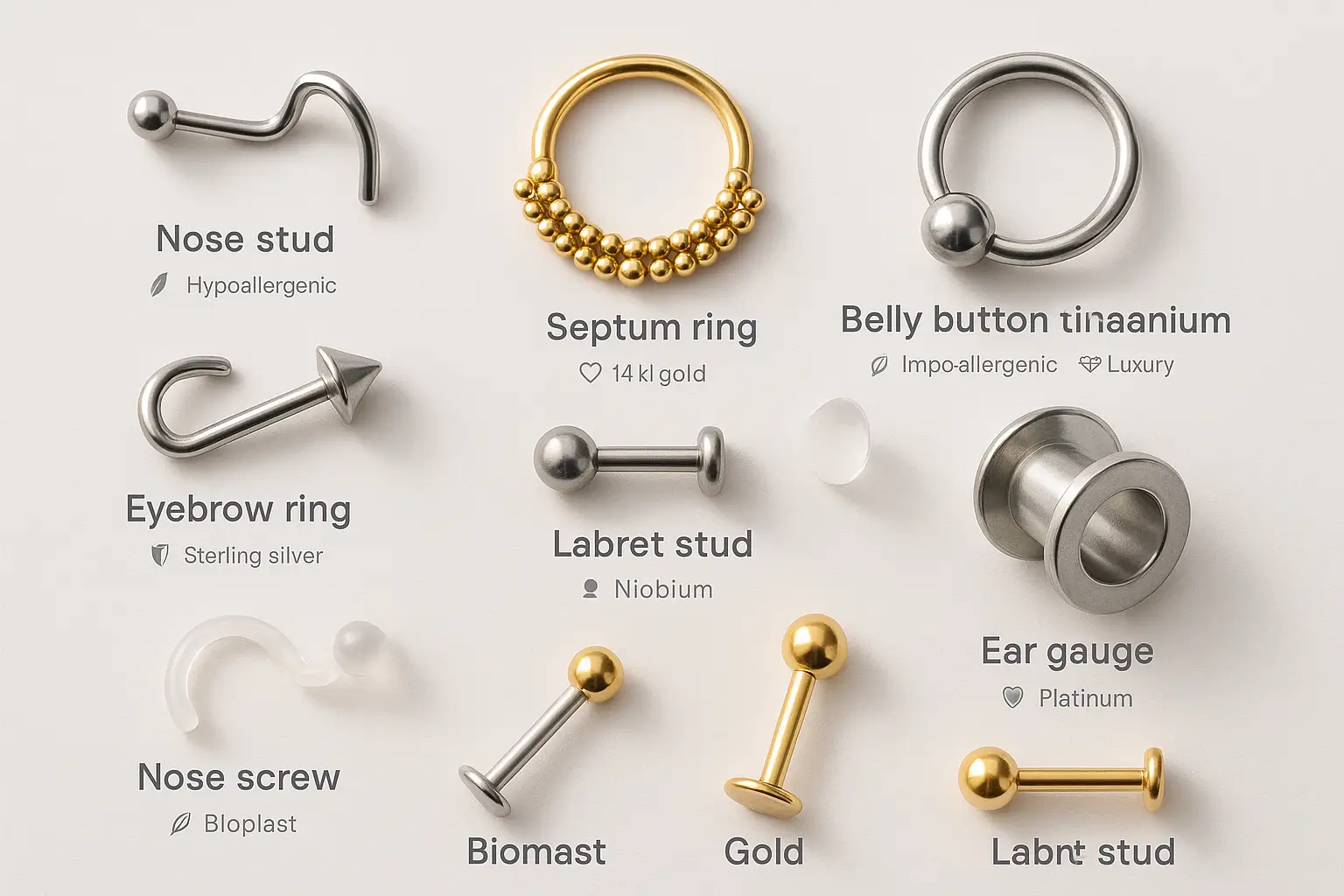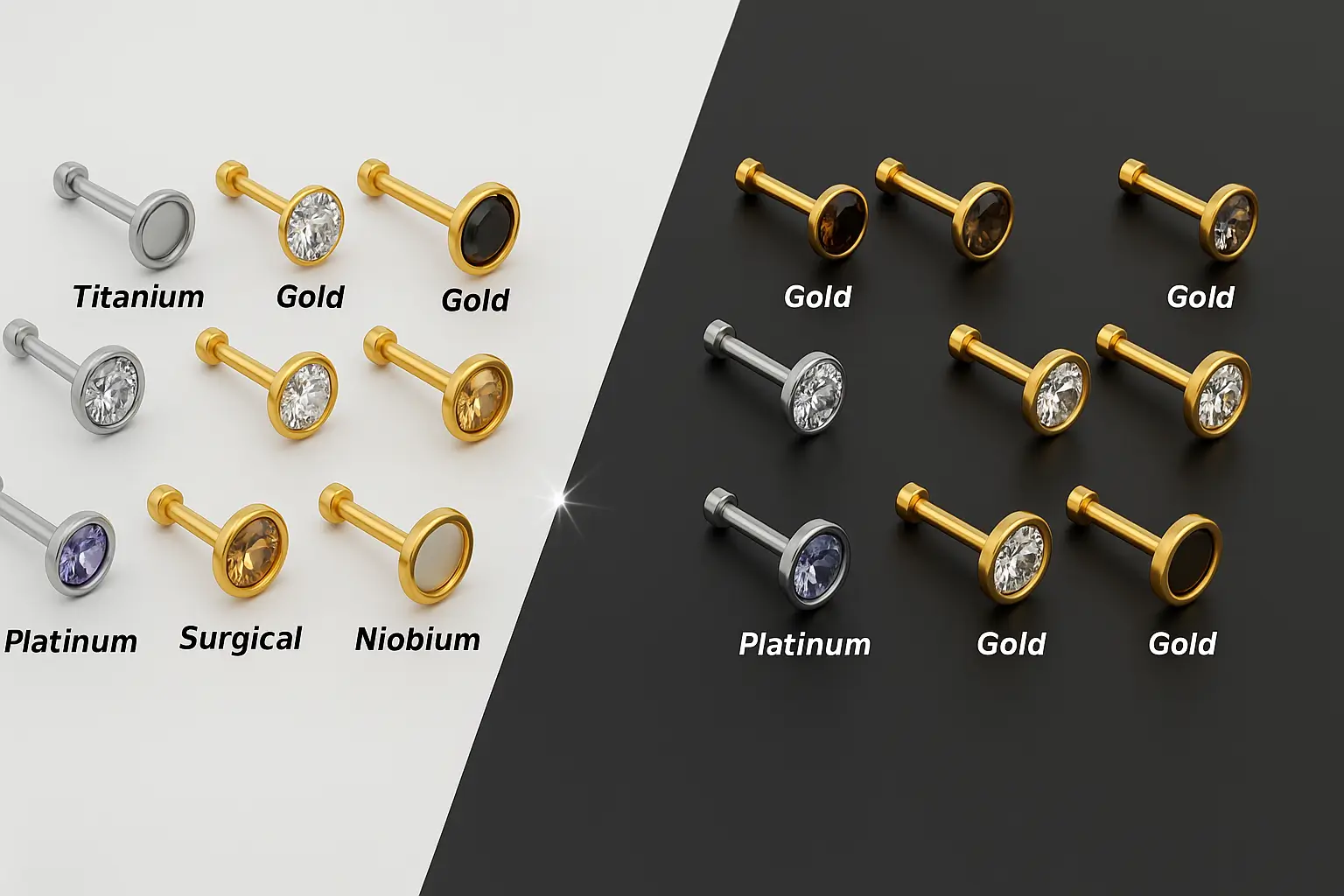Best Nose Stud Material | Type of Best Nose Ring Material For Sensitive Skin?
Selecting the best nose stud material is important for your comfort and style.While selecting nose piercing jewelry, it is important to choose high-quality and safe metal that suits your sensitive skin. Here are some of the safest nose ring materials that can help to prevent infections and ensure long-term wearability, providing a comfortable experience. Below, we've compiled everything you need to know about the top materials for piercing ring studs to help you make an informed decision.

Popular Best Metal for Nose Piercing?
In the market, you will find various types of jewelry materials, such as gold, implant-grade titanium, stainless steel, and others. Some of the popular materials are provided, along with their pros and cons explained based on their unique qualities, to help you choose a high-quality metal.
1. Surgical Steel
Surgical stainless steel is most often preferred for nose piercings, especially by people who are getting a piercing for the first time. This steel is preferred because it is hypoallergenic, which is why it has not been shown to cause any allergic reactions to the skin. This metal is popular among piercing artists and enthusiasts because of its versatile design and affordability.
Pros:
- Versatile in design and look
- A very affordable option for many people
- Ideal for new and healing piercings
- Hypoallergenic in nature and minimizes skin reactions
Cons
- Not enough looking & shining, then precious metal
- Needs consistent cleaning and maintenance
- May become tarnished over time
- It contains an amount of nickel that may cause reactions.
2. Gold Nose Jewelry Studs
Gold, with timeless glamour, stands as a top contender for body piercing jewelry. Gold is less likely to cause skin irritations because it is hypoallergenic, making it a popular choice for many people.
However, gold is very soft and can easily get scratched or damaged from wear. To make it stronger, other metals are added to it, which make its different types based on purity levels, such as 24K, 22K, 18K, and 14K. The higher number of "K" of gold indicates a higher level of purity.
Most piercing artists prefer 14K or 18K gold jewelry because they are more durable than pure gold.
14k Gold: Contains 58.3% pure gold and 41.7% other metals, such as silver, copper, or nickel.
18k Gold: Contains 75% pure gold and 25% other metals.
Pros:
- Hypoallergenic properties in nature reduce skin irritation risks.
- Highly valuable material
- Offers a luxurious feel and appearance with timeless glamour
- Resistant to tarnishing
- Easy to carve or set stones
- Available in yellow, rose, and white variants
Cons:
- Pure gold is malleable and expensive.
- With a risk of lower-quality variants.
- Not ideal for tight budgets
- Requires regular cleaning.
3. Implant Grade Titanium Nose Rings
Titanium is renowned for its exceptional strength and biocompatibility, making it a safe material for human use. Its nickel-free content contributes to its lighter weight compared to brass or steel. The combination of its lightweight properties and corrosion resistance makes it an optimal choice for comfortable daily wear.
Pros:
- Strong and long-lasting
- Lighter than stainless steel
- Hardly any nickel content
- Resists scratches well
- Safe for the body (biocompatible)
- Titanium doesn't cause allergies or irritations, so it's great for sensitive skin.
- Titanium can be anodized to create different colors like black, blue, purple, and green.
Cons:
- Generally more expensive
- Titanium can be more expensive than some other metals like surgical steel.
- There may be fewer styles and designs available compared to other metals.
- Even though titanium is durable, it can still get scratched, especially if it's not handled carefully.

4. Niobium for Nose Piercings Jewelry
Niobium is a rare, crystalline transition metal that is also used in jewelry. It is becoming increasingly popular due to its special properties, hypoallergenic nature, and natural shine. Many jewelry alloys contain various metals, but niobium, being a pure metal, is an excellent choice for individuals with sensitive skin or metal allergies.
Pros:
- Completely hypoallergenic and safe for sensitive skin
- Does not react with bodily fluids, reducing the risk of irritation
- Can be anodized to create vibrant colors without losing its hypoallergenic qualities
- Naturally has a brilliant shine and luster
- Highly resistant to corrosion and tarnishing
Cons:
- Heavier than other metals like titanium
- Often more expensive than stainless steel
- Not as widely recognized or used as titanium or stainless steel
- Harder to find in mainstream jewelry stores, which can limit your options
5. Silver Jewelry
There are two forms of silver that are used in jewelry. "Fine Silver" and "Sterling Silver"
Fine Silver:
If you prefer high-end metal jewelry, consider pure silver for a nose ring. Handle it with care, as it's softer and less durable. Wait until your piercing heals before using silver, as it can tarnish when in contact with bodily fluids.
Sterling Silver:
Sterling silver is 92.5% silver and may not be suitable for sensitive or healing piercings due to its potential to tarnish and contain other metals. It's mainly recommended for well-established piercings.
| Feature | Sterling Silver | Fine Silver |
|---|---|---|
| Silver Content | 92.5% silver, 7.5% other metals | 99.9% pure silver |
| Durability | More durable and scratch-resistant | Softer and more prone to scratching |
| Tarnishing | Tends to tarnish more quickly | Tarnishes less quickly |
| Weight | Heavier | Lighter |
| Common Uses | Jewelry, cutlery, decorative items | High-end jewelry, coins |
| Care | Requires regular polishing | Gentle cleaning needed |
6. Bioplast
Bioplast is a medical-grade "plastic" specifically designed for medical applications. It is biocompatible and ideal for use in piercings, as it minimizes stress and reduces the risk of irritation or injury. It can be heat-sterilized for safety and is suitable for individuals with metal allergies, promoting a healthy healing process.
Pros:
- Bioplast is ideal for individuals with metal allergies.
- It's safe for healing swollen or infected piercings.
- The material's flexibility reduces the risk of irritation or injury.
- Bioplast can be heat sterilized, ensuring cleanliness and reducing infection risks.
- Lightweight and flexible, it's comfortable for extended wear, making it ideal for fresh piercings.
Cons:
- Bioplastic is less durable compared to metals, which may wear out faster or need replacement over time.
- Bioplast may not offer as many design choices or aesthetic appeal as metals like silver, gold, or titanium.
- It can be harder to find in mainstream jewelry stores, limiting design choices.
- The flexibility, while comfortable, may make it unsuitable for those who prefer a firmer, more rigid material for their nose jewelry.
7. Platinum
Platinum is a great choice for nose piercing. It is completely hypoallergenic and also safe for even very sensitive skin. It is commonly less used than other metals like titanium, stainless steel, or gold due to its higher cost. So it is the precious metal option on this list. It is a perfect choice for those seeking a sparkly and high-end look.
Pros:
- Platinum is naturally hypoallergenic, making it ideal for individuals with sensitive skin or metal allergies.
- Platinum is a dense and durable metal that resists wear and tear, scratches, and corrosion, ensuring that your jewelry remains in prime condition over time.
- Unlike silver or some gold alloys, platinum doesn't tarnish or oxidize, so it retains its natural white sheen without regular polishing.
- Its weight and feel give it a sense of luxury and premium quality. The metal holds stones securely, making it ideal for nose rings with gemstones.
- Although more expensive upfront, platinum's durability ensures it lasts long, making it a worthwhile investment
Cons:
- Platinum is one of the most expensive metals used in jewelry, which can be a barrier for some.
- Since platinum is more expensive and rare, it may not be as readily available in many mainstream jewelry stores or a wide range of nose jewelry designs.
Factors to Consider When Choosing a Nose Stud Material
| Feature | Description |
|---|---|
| Sensitivity | If you have sensitive skin, opt for hypoallergenic materials like surgical steel, titanium, or platinum. |
| Durability | Consider your lifestyle and how often you'll wear the nose stud. Durable materials like surgical steel, titanium, and gold are good choices. |
| Aesthetics | Choose a material that complements your personal style and preferences. |
| Cost | The cost of nose studs can vary depending on the material and style. Set a budget and choose a material that fits within your price range. |
Additional Tips
| Feature | Description |
|---|---|
| Avoid nickel | Nickel is a common allergen and can cause irritation. Choose nose studs made of nickel-free materials. |
| Consider the style | The style of your nose stud can also influence the material you choose. For example, a delicate nose ring might be better suited for a lighter material like titanium, while a larger hoop might be more durable in surgical steel. |
| Consult with a professional | If you're unsure about which material is right for you, consult with a body piercer or jeweler for personalized advice. |
| Cost | The cost of nose studs can vary depending on the material and style. Set a budget and choose a material that fits within your price range. |
FAQs - Best Material for Nose Ring Stud
Which material is best for a nose stud for sensitive skin?
For sensitive skin, the best materials for nose studs are implant-grade titanium, platinum, niobium, and surgical stainless steel. These are hypoallergenic, biocompatible, and reduce the risk of irritation and infection.
Is titanium better than surgical steel for nose piercings?
Yes, titanium is often considered better for nose piercings than surgical steel, especially for people with metal sensitivities. Titanium is nickel-free, lightweight, and less likely to cause allergic reactions compared to surgical steel which may contain trace amounts of nickel.
Is gold safe for fresh nose piercings?
Yes, 14k and 18k gold are generally safe for healed or fresh piercings if they are high quality and nickel-free. However, pure gold (24k) is too soft and not ideal for new piercings. Make sure the gold used is from a reputable source and free from alloys that may cause irritation.
Can I wear sterling silver in my nose piercing?
Sterling silver is not recommended for fresh or healing nose piercings because it can tarnish when in contact with bodily fluids, leading to irritation or infection. It is better suited for well-healed piercings and should be cleaned regularly.
Is bioplast a good material for nose studs?
Yes, bioplast is a safe and flexible option, especially for people with metal allergies. It is hypoallergenic, can be sterilized, and is comfortable to wear, making it ideal for healing piercings or sensitive skin.
What is the most luxurious metal for nose studs?
Platinum is considered the most luxurious and premium metal for nose studs. It is hypoallergenic, resistant to tarnishing, and offers a naturally brilliant white shine. It’s perfect for those seeking a high-end look with long-term durability.
How to choose the best material for my nose ring stud?
To choose the best nose ring material, consider your skin sensitivity, healing stage, style preference, and budget. Titanium and surgical steel are great for healing piercings, while gold and platinum offer luxury and durability for long-term use. Always avoid nickel-containing alloys if you have allergies.
 Nose Ring Haven
Nose Ring Haven